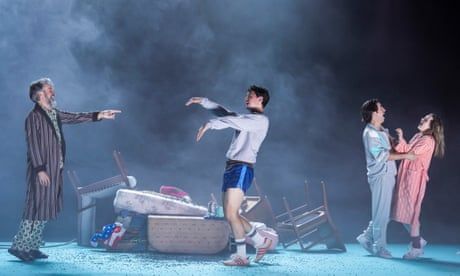
Linbury theatre, London
Henry Neill and Wallis Giunta captivate as the miserable married couple of Bernstein’s unsettling 1952 opera, but even clear orchestration, sumptuous vocals and compelling acting can’t make the later A Quiet Place a convincing work
There’s not much to look at in Oliver Mears’ new production of Bernstein’s 1952 one-acter Trouble in Tahiti. A mid-century modern teak double bed (paisley coverlet, pills on the nightstand); a sleek leather office chair; a punchbag thwacked in time with the composer’s irrepressible syncopations. Even these minimal narrative anchors slide off sporadically, though most scene changes are marked solely by lighting in the subtlest of split-stage effects. Only the duck-egg walls are here to stay. Within them: the coolly miserable marriage of Dinah and Sam, all disappointment and frustration.
In Mears’ staging, there’s no mistaking the fact that the opera’s action is psychological. Sure, the lurid peppiness of the amplified a cappella jazz trio is summoned by Dinah turning on her radio, the singers appearing overhead in suits and shades, their tribute to suburbia snazzily energetic. But their commentary quickly becomes invisible as we listen into his’n’hers sides of the story. Henry Neill’s Sam is smooth but earnest, his top notes disconcertingly limpid as he begs Dinah to be kind. Wallis Giunta is an ideal Dinah, heartbreaking as she recounts her dream of “a quiet place”, can’t-look-away awful in her drunken re-enactment of mid-century racist tropes in the film she’s just seen. Jonah McGovern’s peripheral presence as Young Junior ups the emotional stakes. But nothing is more upsetting than the silence that settles between the couple in their final scene.
Continue reading...